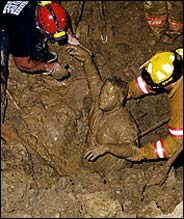If You Try To Re-Build It, They Still Won't Come
Ergonomics Expert Boycott OSHA Symposium
The nation's leading ergonomics experts have announced that they will boycott an upcoming ergonomics research symposium called by OSHA as part of its
COMP
REHENSIVE
APPROACH TO ERGONOMICS.
Assistant Secretary of Labor for OSHA, John Henshaw, is not amused. “The good scientists will engage in the process and participate like responsible people.” The bad, irresponsible scientists objected to the fact that "the focus of the symposium appears to be on research topics already exhaustively reviewed."
One of the leading lies that the anti-ergonomics industry, Congressional Republicans and the Bush Administration used in their campaign to repeal the ergonomics standard was that there was no science behind ergonomics. Despite the fact that there were more good studies done on ergonomics than any other health or safety standard ever issued by OSHA, and despite a comprehensive review of the literature by the
National Institute for Occupational Safety and Health in 1997, Republicans in Congress called for another review by the
National Academy of Sciences (NAS).
When that report was issued in 1998 showing that the kind of work people do is related to musculoskeletal injuries, and that ergonoimc measures can reduce the incidence of those injuries, Republicans called for yet another NAS/Institute of Medicine (IOM) study, hoping that the Clinton administration would "wait for the science" and that a Republican would be in the White House by the time the study was done. That
study, issued in January 2001, shortly after the ergonomics standard was issued, confirmed the findings of the previous study and, like every other scientific study in the history of mankind, called for more research on a number of issues.
Congressional Republicans, ignoring the conclusions of the reports, but seizing on the call for more research, went ahead and repealed the ergonomics standard anyway.
The signers of the letter stated that "Surprisingly, none of this prior work is mentioned in your announcement."
As you know, the NAS/IOM panel of 19 scientists met for 2 years to study these issues and developed a set of carefully considered findings regarding the relationships between occupational risk factors and musculoskeletal disorders. The NAS/IOM panel also made specific recommendations regarding data collection methods by BLS, NIOSH, and NCHS, a potential role for NIOSH to develop uniform definitions of musculoskeletal disorders, and other specific administrative and research recommendations (NAS/IOM 2001 report; pages 364 to 374). It is disturbing that the Department of Labor will expend valuable resources to repeat the work of this and earlier panels and reviews. Those funds would be far better spent implementing the NAS/IOM report recommendations.
Research was one of the four "prongs" of OSHA's
Comp
Rehensive
APproach when it was
announced in 2002, and one of the main reasons for establishment of OSHA National Advisory Committee on Ergonomics.
The honor roll of bad, irresponsible scientists who are refusing to participate in the charade make up many of the country's leading researchers in the area of ergonomics. The signatories are:
David Rempel, M.D., M.P.H.
Professor, Department of Medicine
University of California, San Francisco
Don B. Chaffin, Ph.D.
R.G. Snyder Distinguished University Professor
The University of Michigan
Bradley Evanoff, M.D., M.P.H.
Associate Professor of Medicine
Washington University School of Medicine, St. Louis
Fredric Gerr, M.D.
Professor, Department of Occupational and Environmental Health
University of Iowa
Monroe Keyserling, Ph.D.
Professor, Industrial and Operations Engineering
The University of Michigan
William Marras, Ph.D.
Professor, Industrial and Systems Engineering
Ohio State University
Laura Punnett, Sc.D.
Professor, Department of Work Environment
University of Massachusetts Lowell
Robert Radwin, Ph.D.
Professor and Chair, Department of Biomedical Engineering
University of Wisconsin-Madison
John Rosecrance, P.T., Ph.D.
Professor, Environmental & Radiological Health Sciences
Colorado State University
Barbara Silverstein, Ph.D.
Director, SHARP, Department of Labor and Industries
Washington State
David H. Wegman, M.D., M.Sc.
Dean, School of Health and Environment
University of Massachusetts Lowell
Several of the signatories had served on the NAS/IOM panels, while others had worked with OSHA on the ergonomics standard that was issued in November 2000. Rempel chaired the National Safety Council committee that was on the verge of issuing an ANSI voluntary ergonomics standard before the NSC was
pressured to drop the guidelines in October.

